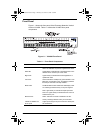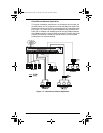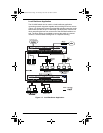
9033630 Product Overview 9
• SNMP-based network manager, in-band
The system can also be managed using SNMP, the most common
protocol used today for network management. Standard agent MIBs
embedded in the switch provide basic SNMP management through
industry-standard SNMP applications.
Management security protection is provided based on SNMP
community names. See Chapter 4, “SNMP Management,” in the
Management Guide for more information.
RMON
RMON (Remote Monitoring) is a facility used to manage networks
remotely while providing multi-vendor interoperability between monitoring
devices and management stations. RMON is defined by an SNMP MIB.
This MIB is divided into nine different groups, each gathering specific
statistical information or performing a specific function. RMON-capable
devices gather network traffic data and then store them locally until
downloaded to an SNMP management station.
The VH-4802 supports four of the nine groups of RMON defined for
Ethernet networks on a per segment basis. Specifically, these are:
• Statistics: a function that maintains counts of network traffic statistics
such as number of packets, broadcasts, collisions, errors, and
distribution of packet sizes.
• History: a function that collects historical statistics based on user-
defined sampling intervals. The statistical information collected is the
same as the Statistics group, except on a time stamped basis.
• Alarm: a function that allows managers to set alarm thresholds based
on traffic statistics. Alarms trigger other actions through the Event
group.
• Event: a function that operates with the Alarm group to define an
action that will be taken when an alarm condition occurs. The event
may write a log entry and/or send a trap message.
Note that RMON statistics and other information can only be viewed using
a connection to the on-board Web agent or via other compatible SNMP
management applications.
Port Mirroring
The VH-4802 switch includes the ability to mirror the traffic being switched
on any port for purposes of network traffic analysis and connection
integrity. When this feature is enabled, a protocol analyzer or RMON
probe can be connected to the mirror port. You can only mirror one port
to another port at one time. Port mirroring occurs at the same speed
configured for the port (10Mbps-to-10Mbps or 100Mbps-to-100Mbps).
Port mirroring is configurable using the console interface menus, the on-
board Web agent, or via SNMP.
ELS100-48tx2m.book Page 9 Thursday, November 16, 2000 4:59 PM


















